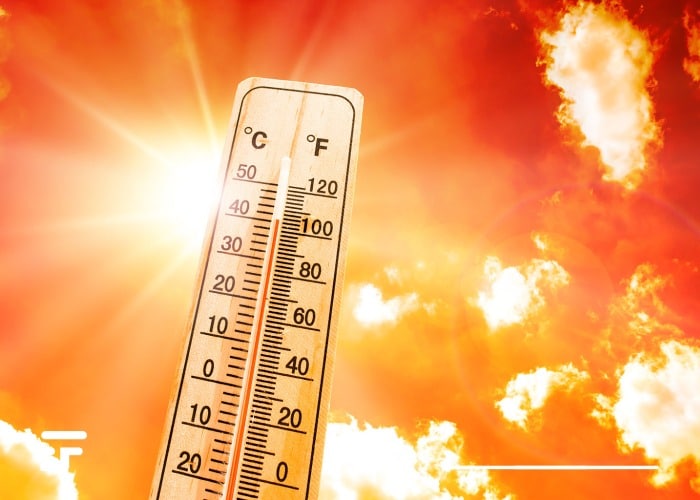2022 is certainly not a year that bodes well for the climate crisis, quite the contrary. Worldwide, record temperatures have been recorded along with an alarming number of fires.
The UK broke its hottest record on 19 July when temperatures hit 40,3°C in the English village of Coningsby. June brought Japan's worst heat wave since records began in 1875, bringing the country's highest ever temperature to 40,2°C. China's coastal megacities, from Shanghai to Chengdu, are were hammered by heat waves in July, with temperatures often topping 40 degrees Fahrenheit. In the United States, a series of heat waves gripped the Midwest, South and West during June and July. Temperatures reached 42 degrees Fahrenheit in North Platte, Neb. and 45,6° C in Phoenix.

Joshua Stevens / NASA Earth Observatory
Source: Geos-5 data from the global modeling and assimilation office / NASA GSFC, data from the Suomi national polar-orbiting partnership day-night viirs band.
The effects of heat on our body
The heat is already having an increasing impact on human health. It can cause heat cramps, heat exhaustion and heat stroke, often fatal. Dehydration can lead to kidney and heart disease. Extreme heat can even change our behavior, increasing aggression and decreasing our ability to concentrate.
Just as climate change continues to raise temperatures, scientists are working rapidly to understand the limits of human resistance to extreme temperatures. Recent research suggests that heat stress tolerance in people may be lower than previously thought. If true, millions more people could risk succumbing to dangerous temperatures sooner than expected.
When does the heat get too hot?
In the last ten years, 35 ° C it was considered the temperature beyond which humans are no longer able to regulate the temperature of their body. But recent laboratory research, conducted by Daniel Vecellio and his colleagues at Pennsylvania State University, suggests that the average human threshold for heat stress is much lower, even for young, healthy adults.
The researchers, in fact, monitored heat stress in two dozen subjects aged between 18 and 34, in a series of controlled climates. In the series of experiments, the team varied the humidity and temperature conditions inside an environmental chamber, sometimes keeping the temperature constant and varying the humidity, other times vice versa.
The subjects subjected themselves to just enough effort inside the chamber to simulate minimal outdoor activity, walking on a treadmill or slowly pedaling a bicycle without resistance. During these experiments, which lasted 1,5 to 2 hours, the researchers measured the subjects' skin temperatures using wireless probes and assessed their core temperatures using a small telemetry pill that the subjects swallowed.
The results
In hot, humid conditions, study subjects were unable to tolerate heat stress at temperatures close to 30 ° or 31 ° C, according to the team's estimates. In conditions of heat and drought, the tolerated temperature was even lower, between 25 ° and 28 ° C, the researchers reported in the Journal of Applied Physiology. To give an example, in a very dry environment with around 10% humidity, a theoretical temperature of 25°C would correspond to an air temperature of around 50°C.
These findings suggest that there is still a lot of work to be done to understand what humans can tolerate in real-world heat and humidity, but that the threshold may be much lower than we think, Vecellio says. The theoretical 35°C result from the 2010 study may still be “the upper limit,” he adds. “We're trying to find the lower limit.”
And let's not forget that this applies to healthy young adults with minimal activity. Thresholds for heat stress are likely to be lower for strenuous outdoor workers, or for older adults or children. Evaluating laboratory limits for those most at risk is the subject of ongoing work for Vecellio and his colleagues.

To conclude, the climate crisis is a serious problem that affects us all closely, regardless of the threshold temperatures that our body is able to tolerate. It is therefore important to pay the utmost attention to protect your health and to be aware of what role we can play, as individuals, in addressing this crisis.


